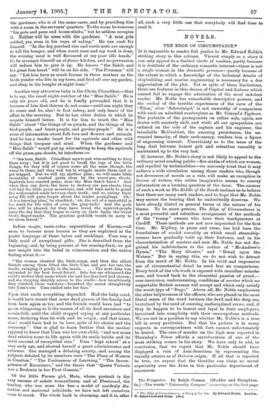IT is impossible to render full justice to Mr. Edward
Noble's striking story in this column. Viewed simply as a story it can only appeal to a limited circle of readers, partly because it is destitute of the ordinary romantic interest—there is not a single woman in the dramatis personae—partly because of the extent to which a knowledge of the technical details of
shipbuilding and marine engineering is necessary for a due appreciation of the plot. Yet in spite of these limitations, there are features in this drama of Capital and Labour which cannot fail to engage the admiration of the most indolent reader. Mr. Noble has remarkable descriptive powers, and the recital of the terrible experiences of the crew of the Titan,' alias Schweinigel,' is not unworthy of comparison with such an admitted masterpiece as Mr. Conrad's Typhoon.
The portraits of the protagonists on either side, again, are drawn with masterly skill, and while all our sympathies are enlisted on the side of the captain and his engineer, the inimitable McGrabbut, the amazing persistence, the un- wearied tenacity, of their arch-enemy, renders him a figure of engrossing interest. Uncertainty as to the issue of the long duel between honest grit and relentless rascality is maintained up to the very last.
If, however, Mr. Noble's story is not likely to appeal to the ordinary novel-reading public—five-sixths of which are women, and repelled by technicalities—we sincerely trust that it may achieve a wide circulation among those readers who, though not devourers of novels as a rule, will make an exception in favour of writers who utilise imaginative means to convey information on a burning question of the hour. The success of such a work as The Riddle of the Sands inclines us to believe that there are many such readers, and to hope that Mr. Noble
may secure the hearing that he undoubtedly deserves. We have already hinted in general terms at the nature of his theme. To be more precise, The Edge of Circumstance is a most powerful and relentless arraignment of the methods of the " tramp " owners who have their headquarters at Cardiff. These methods are not now impeached for the first time. Mr. Kipling, in prose and verse, has laid bare the foundations of sordid rascality on which small steamship- owners have gradually built up their fortunes, and in his characterisation of masters and men Mr. Noble has not dis- . guised his indebtedness to the author of " McAndrew's Hymn," " The Mary Gloater," and " Bread upon the Waters." But in saying this, we do not wish to detract from the merit• of Mr. Noble. In his vivid and impressive use of circumstantial detail he need fear no comparisons. Every trick of the vile trade is exposed with merciless minute- ness, and traced back to the elemental passion of greed,- over-insurance, undermanning, conditions of service which no respectable British seaman will accept and which only satisfy the worst type of " Dago." Above all, Mr. Noble emphasises the utter helplessness of the officers, who are placed in the most literal sense of the word between the devil and the deep sea, brutalised by the need of coercing undisciplined crews, and, if they do happen to be honest and loyal to their employers, terrorised into complicity with their unscrupulous methods.
We are not in a position to say whether Mr. Noble's is a true bill in every particular. But that his picture is in many respects in correspondence with fact cannot unfortunately be denied. The case of murder on the high seas reported in Thursday's Times affords a corroboration of one of the most striking scenes in his story. We have only to add, in conclusion, that we regret that Mr. Noble should have displayed a vein of Anti-Semitism by representing the rascally owners as of Hebrew origin. If all that is reported be true, we expect that the Gentiles can claim no moral superiority over the Jews in this particular department of commerce.
The Prospector. By Ralph Connor. (Hodder and Stoughton. 6s.)—The words " University Campus " occurring on the first page






































 Previous page
Previous page